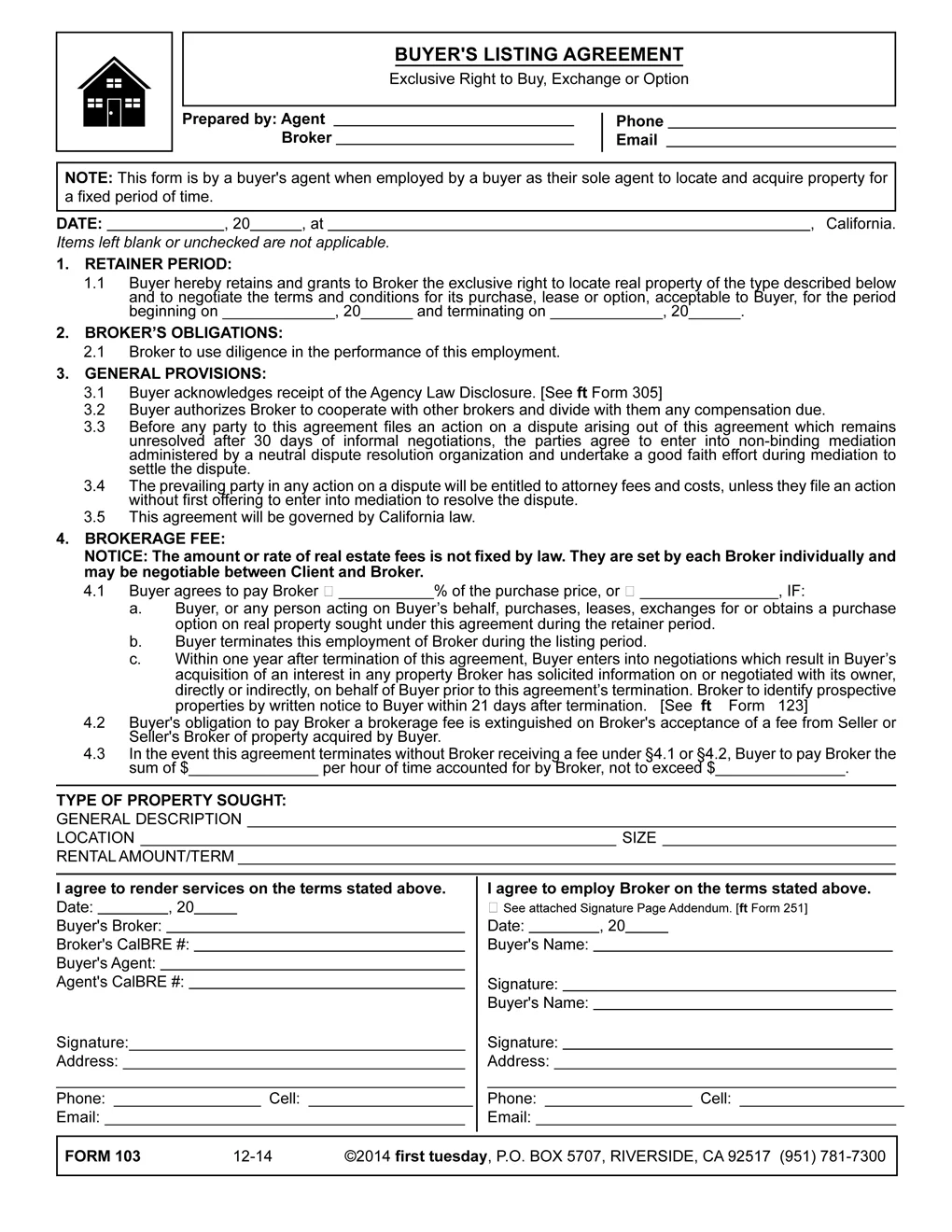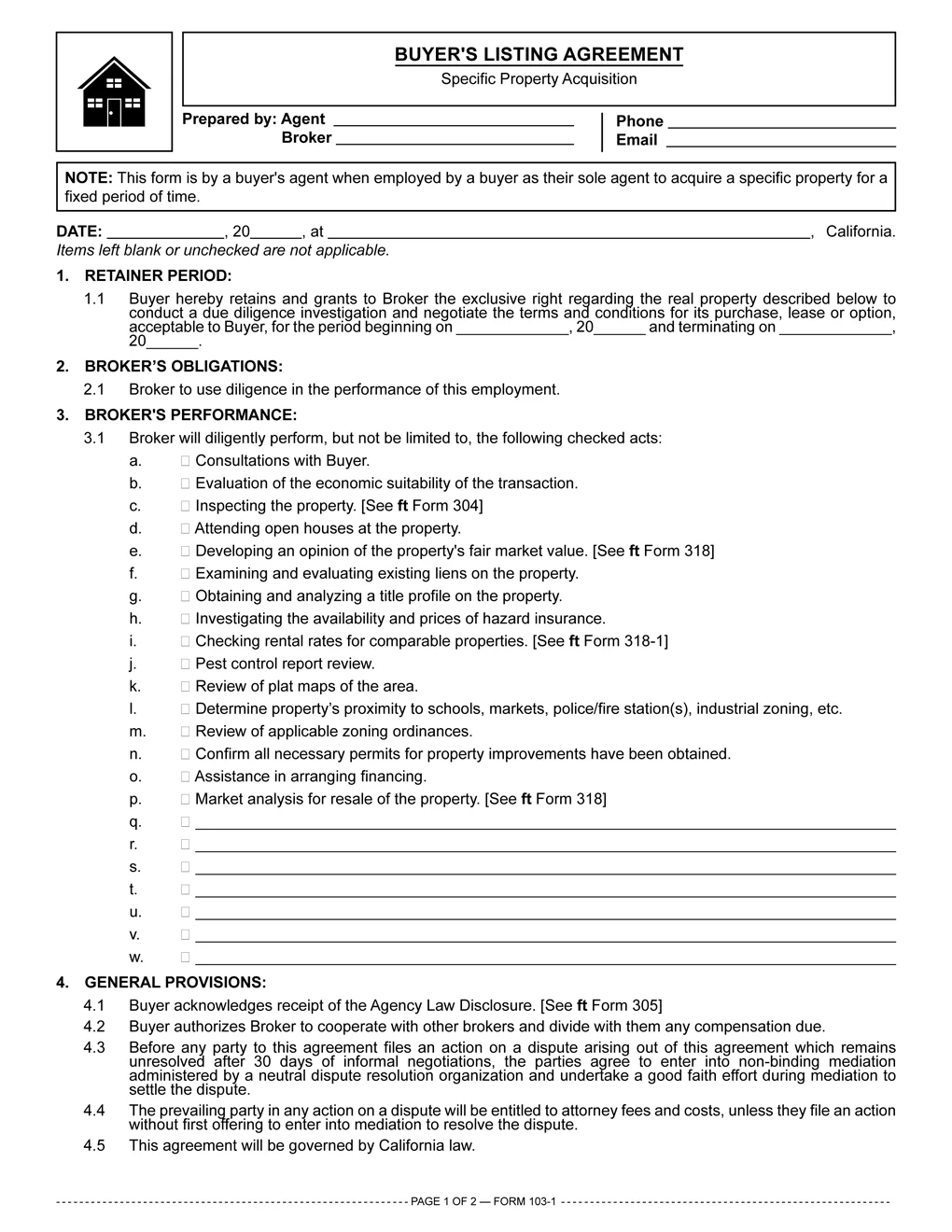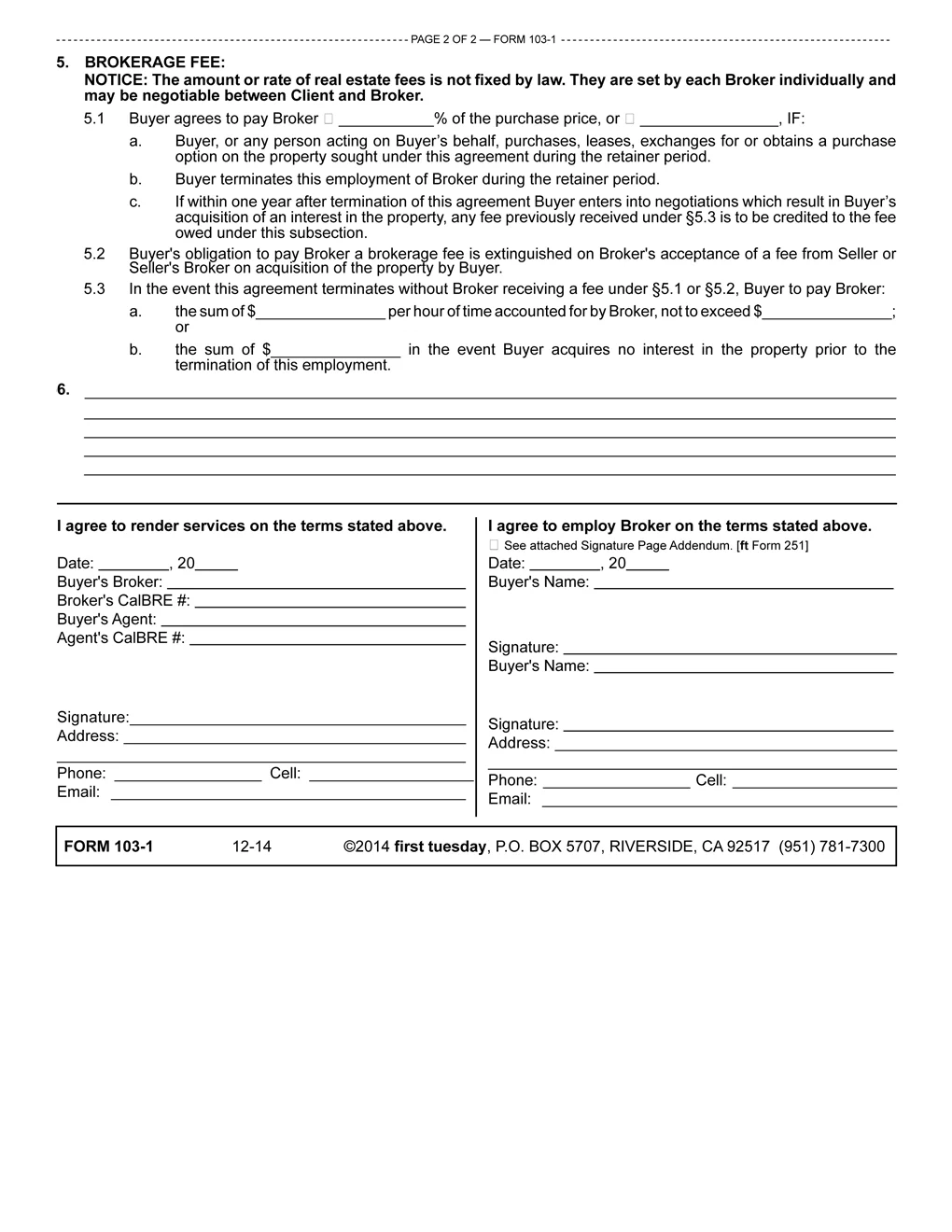Form-of-the-week: Buyer’s Listing Agreements – Exclusive Right to Buy, Exchange or Option and Specific Property Acquisition – Form 103 and 103-1
Authority to act on the buyer’s behalf
A listing agreement is a written employment arrangement between a client and a licensed real estate broker. On entering into a listing agreement, the broker or their agents are retained and authorized to diligently perform real estate related services on behalf of the client in exchange for payment of a fee. [Calif. Civil Code §1086(f); see RPI Form 102-104 and 110-112]
A client who retains a broker may hold an ownership interest in real estate, which the client seeks to:
- sell [See RPI Form 102 and 102-1];
- lease [See RPI Form 110]; or
- encumber as collateral for mortgage financing. [See RPI Form 104]
Further, the client retaining the services of a broker may be seeking to acquire an interest in real estate as a:
The individual employed by a client to provide real estate services in expectation of a fee is always a licensed real estate broker. Thus, if a dispute arises with a client over the client’s failure to pay the agreed-to fee, it is the broker employed under a written listing signed by the client who pursues collection.
A real estate agent employed by the broker may solicit and enter into a listing, but the agent does so acting on behalf of the broker. The agent has no independent right to enter into or enforce a listing agreement naming the agent as the person employed. Essentially, the agent is an agent of the agent — their employing broker.
A variety of listing agreements exist, each employing and authorizing a broker to perform real estate related services under different conditions. The variations usually relate to:
- the type of services to be performed by the broker and their agents;
- the extent of the broker’s representation; and
- the events which trigger payment of a fee. [See RPI Form 102-104 and 110-112]
The objective served by most types of listing agreements is the sale or purchase of single family residential (SFR) property. Others are for residential-income and commercial-income properties comprising industrial, retail, office, farm and motel/hotel or unimproved parcels.
Without regard to various agreements or the type of property described in the listing, all listings fall into one of two general categories or employment:
- exclusive; or
- open.
For brokers and their agents, an exclusive right-to-buy listing agreement creates a parallel activity to a right-to-sell listing for marketing property for sale. Under a buyer’s listing, a prospective buyer employs a broker to locate suitable properties of the type and utility the buyer seeks to purchase. [See RPI Form 103]
As with an exclusive right-to-sell listing, the exclusive right-to-buy variation contains provisions stating a broker fee is to be paid by the buyer — unless the seller agrees to pay the fee — when the buyer acquires property of the type described in the buyer’s listing during the term of the listing or safety period.
Importantly, use of the exclusive right-to-buy listing provides greater incentive for brokers and their agents to perform since the buyer’s commitment to pay a fee is in writing. Further, the exclusive aspect imposes a duty to work diligently and continuously to meet their buyers’ objectives. [See RPI Form 103 §2.1]
The buyer, on entering into an exclusive right-to-buy listing, also benefits from the greater likelihood the broker and their agent will find the particular type of property sought. The safeguard under a written employment is the screening of property by the broker and their agent since they:
- have extensive access to available properties;
- investigate and qualify available properties as suitable before they are presented to the buyer; and
- advise the buyer on both the short and long-term advantages and disadvantages of each property presented.
Critically, a buyer’s broker locating properties listed by other brokers does not become a dual agent or lose their status as the buyer’s exclusive agent when the buyer’s broker coordinates with a seller’s broker to obtain information on their listings.
Also, the seller typically pays the buyer’s broker’s fee — either directly (which is the best practice) or through the seller’s broker. This fee activity does not create a dual agency.
A broker who seeks and locates properties at their buyer’s request does so and negotiates the purchase terms as the buyer’s agent regardless of who pays the fee. Again, the seller typically pays the fee from the gross sales proceeds paid by the buyer.
Alternatively, the buyer may directly pay their broker’s fee as part of their total purchase price — their cost of acquisition of the property. With the buyer’s agent paid, the seller receives the remainder of the price paid as their gross proceeds from the sale and is responsible for payment of any fees the seller’s broker has earned. [See RPI Form 151 §9.1]
As always, all compensation received by a broker and their agents arising out of a transaction involving their client needs to be fully disclosed to the client.
Related articles:
Brokerage Reminder: A buyer’s retainer agreement – the written fee guarantee
The Buyer’s Listing Agreement – Exclusive Right to Buy, Exchange or Option published by RPI (Realty Publications, Inc.) is used by brokers and their agents to prepare and submit to prospective buyers their offer to render services on their behalf as the buyer’s sole real estate agent. Under the listing, a broker is employed to locate property sought by the buyer in exchange for the buyer’s payment of a fee when the buyer acquires the type of property sought. [See RPI Form 103]
Under the Statute of Frauds, signed written documentation of an obligation to ensure the payment of a fee is the legislatively enacted and judicially mandated requisite to collection of a brokerage fee. Written documentation is critical to manage the relationship when working for a buyer.
Each section in Form 103 has a separate purpose and need to enforce collection of the fee earned. The sections include:
- Brokerage services: The employment period for rendering brokerage services and the broker’s due diligence obligations are set forth in Sections 1 and 2. General provisions for enforcement of the employment agreement and broker fee-splitting arrangements are included in Section 3;
- Brokerage fee: The buyer’s obligation to either pay a brokerage fee or assure payment of the brokerage fee by the seller or seller’s broker, the amount of the fee and when the fee is due are set forth in Section 4;
- Property sought: A general description of the type of property to be located for the buyer is entered; and
- Signatures and identification of the parties: On completion of entries on the listing form and any attached addenda, the buyer and the broker (or agent) sign the document consenting to the employment.
Without the buyer’s written promise to pay a fee, the broker cannot enforce collection when the buyer attempts to bypass them and acquire property of the type sought or on which the broker provided information.
Without the buyer’s written promise contained in a buyer’s listing agreement, no fee earned is collectable from anyone, unless:
- the broker enters into an oral or written fee-sharing agreement with the seller’s broker documenting the buyer as their client (which is a precarious arrangement); or
- the seller intentionally interferes with the performance of the buyer’s oral (or written) promise to pay a fee.
Most real estate transactions involving a buyer’s agent include a commitment of the agent’s time locating qualifying properties for the buyer. However, the buyer’s agent bypasses the initial step of locating a property when:
- they register a buyer they represent at a real estate auction;
- the buyer has already located a specific property to purchase without the assistance of the agent; or
- the buyer and agent have already located a property of interest and no prior written employment agreement exists which assures payment of a fee to the broker. [See RPI Form 103]
When the buyer has selected a specific property and no prior fee agreement has been agreed to in writing, the agent needs to enter into a written single property fee agreement with their buyer.
The Buyer’s Listing Agreement – Specific Property Acquisition published by RPI is used by a buyer’s agent when employed by a buyer as their sole agent retained for a fixed period of time, to negotiate the acquisition of a specific property that has already been located. The agreement safeguards the agent’s time spent on behalf of the buyer by assuring collection of a fee if the buyer acquires the identified property. [See RPI Form 103-1]
When the agent’s duties do not include locating a suitable property, the specific property agreement lists the particular tasks the agent is to do pertaining to the described property to receive their fee, such as:
- evaluating the economic suitability of the price and terms of payment proposed;
- attending an open house with the buyer prior to an auction or submitting a written offer;
- obtaining and analyzing a title profile on the property;
- examining pest control reports;
- obtaining plat maps of the area surrounding the property;
- checking the property’s proximity to schools, markets, financial institutions, etc.; and
- developing an opinion of the property’s fair market value (FMV). [See RPI Form 103-1 §3.1]
When the buyer has already identified a suitable property, either prior to or while working with an agent, the buyer’s agent needs to enter into a single property fee agreement with the buyer as soon as possible. With the signed writing in hand, the agent holds an enforceable fee arrangement with the buyer. This formally employs the agent to commence negotiations and also assures payment of a fee if the buyer acquires the property, whether it is the buyer or the seller who eventually pays the fee. [L. Byron Culver & Associates v. Jaoudi Industrial & Trading Corporation (1991) 1 CA4th 300]
Use of the single property fee agreement is particularly critical in a real estate auction situation. At an auction, a buyer’s agent has absolutely no assurance their buyer will be the highest bidder who acquires the property. Thus, a buyer’s agent under a regular buyer’s listing agreement calling for a fee to be paid on the buyer’s acquisition of the property runs the risk of receiving no compensation for their time, effort and talent performing due diligence investigations and assisting in the bidding.
When the buyer does successfully acquire the property as the highest bidder, the single property fee arrangement is structured as a percentage of the price paid, such as 3%, or a fixed dollar amount, to be paid by the buyer (unless the terms of the sale include the amount of fee the broker expects to earn). [See RPI Form 103-1 §5.1]
However, when the buyer is not the successful bidder, the buyer’s agent is still paid a fee. The fee under the single property agreement calls for compensation based on an hourly wage for the agent’s time spent investigating and assisting the buyer prior to the auction event. Alternatively, the agent can state a flat fee be paid for their services rendered when the buyer fails to acquire the property at auction. [See RPI Form 103-1 §5.3(a), (b)]

















